#TechRecycling
Explore tagged Tumblr posts
Text
How AI is Revolutionizing E-Waste Sorting and Recycling
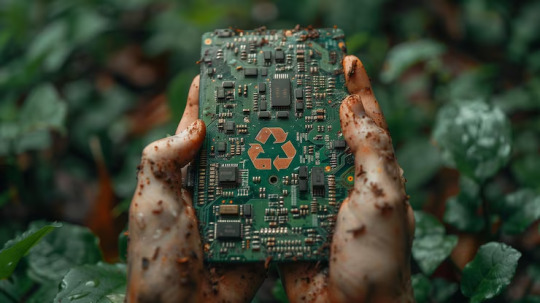
In the age of rapid technological advancement, managing electronic waste (e-waste) has become a critical environmental priority. With increasing volumes of discarded gadgets, from smartphones to servers, traditional recycling methods are proving inefficient and unsustainable. Enter Artificial Intelligence (AI) the game-changer in e-waste management.
The Growing Challenge of E-Waste
India alone generates over 3 million tonnes of e-waste annually, making it one of the top e-waste producing nations. Items like old laptops, mobile phones, batteries, computer parts, and servers are disposed of every day. The improper handling of this waste not only contributes to environmental degradation but also poses serious health risks due to the presence of hazardous materials like lead, mercury, and cadmium.
AI-Powered Sorting Systems
One of the biggest challenges in e-waste recycling is the efficient identification and segregation of valuable components from hazardous waste. AI is now transforming this process with intelligent sorting systems equipped with machine vision and deep learning algorithms.
These systems can:
Identify materials: Using cameras and sensors, AI detects plastics, metals, and circuit boards with high precision.
Enhance speed and accuracy: Unlike manual sorting, AI-driven systems operate 24/7 and reduce human error.
Automate decision-making: Intelligent algorithms assess item condition, resale value, and recyclability, optimizing the recovery process.
Robotics in E-Waste Dismantling
AI-powered robots are being used to safely dismantle electronics without damaging recoverable parts. These robotic arms, guided by real-time image recognition, can unscrew, separate, and sort components faster and safer than manual labor. This is particularly beneficial when handling complex devices like laptops or smartphones with intricate assemblies.
Predictive Maintenance in Recycling Plants
AI also supports predictive maintenance in e-waste recycling plants by analyzing machine performance data to forecast breakdowns. This helps in reducing downtime and maintaining continuous operations, increasing overall plant efficiency.
Data-Driven E-Waste Management
With the integration of AI and big data analytics, companies like Techazar are revolutionizing e-waste tracking and logistics. From collection and transportation to dismantling and disposal, every step is now optimized through data insights. AI enables real-time tracking of electronic waste streams and provides transparency in compliance with EPR (Extended Producer Responsibility) norms.
Advantages of AI in E-Waste Solutions
Improved resource recovery
Reduced environmental impact
Enhanced compliance with ISO and CPCB standards
Cost-effective and scalable recycling
Conclusion
The future of sustainable e-waste recycling lies in the seamless fusion of technology and environmental responsibility. At Techazar, we’re committed to leading this revolution with AI-driven e-waste solutions that ensure smarter, safer, and greener practices. Whether you're a business looking for responsible IT asset disposition or need certified e-waste recycling near you, Techazar offers Pan India services with end-to-end support.
For more details, visit www.techazar.in
#AIRecycling#EWasteManagement#SustainableTechnology#ElectronicWaste#Techazar#AIInRecycling#GreenTech#WasteManagementSolutions#ElectronicRecycling#SmartRecycling#EcoFriendlyTech#EwasteSolutions#RecyclingInnovation#ITAssetDisposal#RecycleElectronics#PanIndiaServices#EWasteRevolution#AIForSustainability#TechRecycling#EwasteNearMe#DigitalWasteManagement#ISORecycling#CPCBCertified#EPRCompliance#AIWasteSorting
0 notes
Text

Sounds impressive, right? 😲
It’s a finding by the European Environmental Bureau in 2021. According to the report, lengthening the life of all European smartphones by a single year could save as much CO₂ as taking one million cars off the road each year.
0 notes
Text

Sell My iPad 9.7 Inch – Best Trade-In Deals at 247GreenGadgets
Looking to sell your iPad 9.7 inch? 247GreenGadgets offers the best value for your iPad Pro 9.7 trade-in. Fast, secure, and hassle-free service you can trust.
Visit: www.247greengadgets.co.uk
#SellMyiPad#iPadTradeIn#iPadPro9_7#TechTradeIn#247GreenGadgets#SellYourGadget#UsediPad#iPadResale#BestiPadDeals#EcoFriendlyTech#GadgetBuyback#TechRecycling#UKTechTradeIn#SelliPadUK
0 notes
Text
Sell Samsung Phones - Get the Best Value for Your Device Today!

Ready to upgrade? If you're looking to Sell Samsung Phones, TEC Surgery offers a quick, secure, and hassle-free process to help you get top dollar for your device. Whether you’re selling a Galaxy S series, Note, or any other model, we provide fair, competitive pricing based on your phone’s condition. Enjoy fast payment, easy transactions, and excellent customer service when you choose to sell your Samsung phone with us. Don't let your old phone go to waste—sell it today and get the value you deserve!
#SellSamsungPhones#SamsungTradeIn#SellYourPhone#GetCashForSamsung#UpgradeYourPhone#SamsungPhoneSale#TechUpgrade#SellSmartphone#SamsungGalaxyTradeIn#FastPhoneSale#SamsungPhoneValue#TechRecycling#PhoneSellService#SellYourDevice#QuickPhoneSale
1 note
·
View note
Text
Revolutionizing Environmental Sustainability: The e-Waste Management Project by WasteMaterial
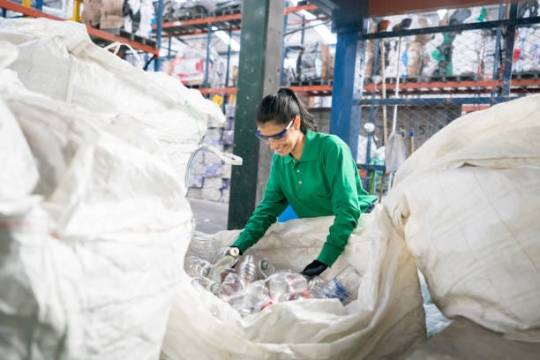
Understanding the E-Waste Predicament
The proliferation of electronic devices has resulted in a staggering amount of e-waste worldwide. From smartphones to laptops, these devices contain hazardous materials like lead, mercury, and cadmium, posing severe risks to human health and the environment if improperly disposed of. Unfortunately, traditional waste management systems often fall short in handling this specialized category of waste, leading to rampant pollution and resource depletion.
WasteMaterial: Leading the Charge for Change
Enter WasteMaterial, a visionary company dedicated to revolutionizing e-waste management. With a keen focus on sustainability and innovation, WasteMaterial has developed a comprehensive project aimed at mitigating the adverse effects of e-waste on our planet. Their holistic approach encompasses various facets of e-waste management, setting new standards for environmental responsibility and corporate citizenship.
Key Components of WasteMaterial’s E-Waste Management Project
Collection and Recycling: WasteMaterial operates a widespread network for the collection of e-waste, ensuring convenient disposal options for consumers and businesses alike. Through strategic partnerships with recycling facilities, they ensure that collected e-waste undergoes proper dismantling and recycling processes, minimizing the release of hazardous substances into the environment.
Resource Recovery: Recognizing the value of materials embedded in electronic devices, WasteMaterial emphasizes resource recovery as a cornerstone of their project. By employing advanced techniques such as material separation and extraction, they recover valuable metals and components from e-waste, reducing the need for virgin resources and promoting a circular economy.
Awareness and Education: WasteMaterial understands that sustainable change begins with education. As part of their project, they conduct extensive awareness campaigns and educational programs to enlighten communities about the importance of responsible e-waste management. By fostering a culture of environmental consciousness, they empower individuals to make informed choices and actively participate in waste reduction efforts.
Innovation and Research: With a commitment to continuous improvement, WasteMaterial invests in research and development to explore innovative solutions for e-waste management. From novel recycling technologies to eco-friendly product design, they strive to push the boundaries of sustainability and set new industry benchmarks.
Impact and Sustainability
The impact of WasteMaterial’s e-waste management project extends far beyond mere waste disposal. By diverting e-waste from landfills and incinerators, they prevent the release of harmful pollutants into the air, soil, and waterways, safeguarding ecosystems and public health. Moreover, their emphasis on resource recovery reduces the demand for raw materials, conserving natural resources and mitigating environmental degradation.
Join the Movement
As champions of environmental sustainability, WasteMaterial invites individuals, businesses, and policymakers to join their movement for responsible e-waste management. By supporting initiatives like theirs, we can collectively combat the e-waste crisis and pave the way for a greener, more sustainable future.
In conclusion, WasteMaterial’s e-waste management project stands as a testament to the power of innovation and commitment in addressing pressing environmental challenges. Through their pioneering efforts, they offer a glimmer of hope amidst the looming specter of e-waste, inspiring us to rethink our relationship with technology and the environment. Together, let us embrace the ethos of sustainability and propel towards a cleaner, healthier planet for generations to come.
#EcoFriendlyTech#GreenInnovation#SustainableLiving#CircularEconomy#ReduceReuseRecycle#DigitalResponsibility#TechRecycling#ConsciousConsumption#GreenTechnology#WasteFreeWorld#EnvironmentalStewardship#EcoConscious#ZeroWasteGoals#GreenFuture#SustainableSolutions#RenewableResources#PlanetFirst#EcoAwareness#ResponsibleConsumption#CleanTech#WasteReduction#EcoInnovation#SustainableBusiness#EarthFriendly#GreenRevolution#SustainableDevelopment#EcoFriendlyProducts#ClimateAction#GreenEfforts#WasteManagementHeroes
1 note
·
View note
Text
#TechTradeIn#DecluttrMarketplace#ElectronicsResale#QuickPayment#GadgetExchange#TechRecycling#EcoFriendlySelling#CashForElectronics#CharityDonations#SecondhandTech
0 notes
Text
Indian Recycle Industry of Electronic Goods
Written By: Jagriti Shahi
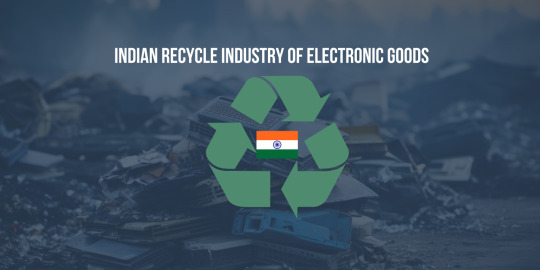
Introduction
In an era dominated by technological advancement, the rapid evolution of electronic devices has led to a consequential surge in electronic waste (e-waste) worldwide. From smartphones and laptops to household appliances and industrial machinery, the proliferation of electronic goods has revolutionized how we live, work, and communicate. In India, a country witnessing robust growth in its technological landscape, the management of electronic waste has emerged as a critical challenge, necessitating innovative solutions and sustainable practices.
As India's economy continues to flourish and its population embraces digital connectivity, the demand for electronic gadgets has reached unprecedented levels. The country's burgeoning middle class, coupled with the government's ambitious Digital India initiative, has accelerated the adoption of smartphones, tablets, and other electronic devices across urban and rural landscapes alike. While this technological leap has undoubtedly empowered millions, it has also led to a corresponding increase in electronic waste generation, posing significant environmental and health risks if not managed effectively.
Amidst this backdrop of rapid technological progress and escalating e-waste concerns, the Indian recycling industry of electronic goods has emerged as a beacon of sustainability and innovation. This industry encompasses a diverse ecosystem of stakeholders, including formal recyclers, informal scrap dealers, government agencies, and technology innovators, all working towards the common goal of responsibly managing electronic waste while harnessing its latent value.
The Emergence of the Indian Recycling Industry
Acknowledging the pressing need for effective e-waste management, India has witnessed the rise of a dynamic recycling industry. This sector encompasses a wide array of stakeholders, including formal recyclers, informal scrap dealers, government agencies, and technology innovators, all working towards the common goal of responsibly managing electronic waste while harnessing its latent value.
Formal recyclers in India have made significant strides in adopting environmentally sustainable practices. These entities employ advanced technologies and standardized processes to dismantle, segregate, and recycle electronic waste efficiently. By adhering to stringent environmental and occupational health standards, formal recyclers ensure the safe handling and disposal of hazardous materials, minimizing the risk of environmental contamination and public health hazards.
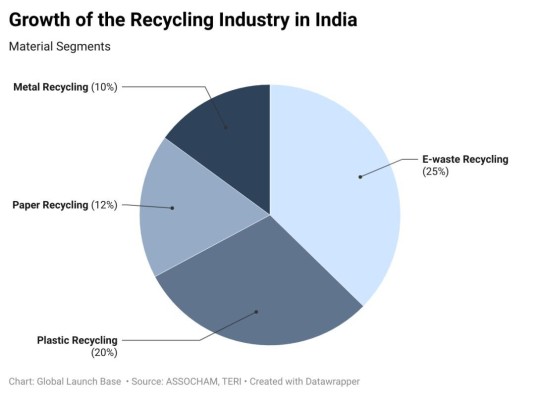
Figure: Growth of the Recycling Industry in India
In parallel, informal scrap dealers constitute a significant segment of India's recycling ecosystem, particularly in urban and peri-urban areas. These individuals or small-scale enterprises engage in the collection, dismantling, and resale of electronic waste using rudimentary techniques and manual labor. While informal recyclers play a role in diverting electronic waste from landfills and promoting resource recovery, their operations often lack environmental safeguards and pose risks to worker health and safety.
To address the challenges associated with informal recycling practices, government agencies in India have implemented regulatory frameworks aimed at formalizing and incentivizing responsible e-waste management. The E-Waste (Management) Rules, 2016, introduced by the Ministry of Environment, Forest and Climate Change, establish guidelines for the collection, segregation, transportation, and recycling of electronic waste. These rules mandate extended producer responsibility (EPR), requiring manufacturers to manage and finance the environmentally sound disposal of their products at the end of their lifecycle.
Furthermore, the Indian government has launched initiatives to promote public awareness and participation in e-waste recycling efforts. Campaigns such as Swachh Bharat Abhiyan and Clean India Mission emphasize the importance of responsible waste management practices, including the segregation and recycling of electronic waste. By fostering a culture of environmental stewardship and accountability, these initiatives aim to mobilize communities and industries towards sustainable consumption and production patterns.
Innovations in technology and business models have also played a pivotal role in shaping the landscape of India's recycling industry. Startups and entrepreneurs are leveraging digital platforms, data analytics, and IoT (Internet of Things) solutions to optimize waste collection, streamline logistics, and track the flow of materials within the recycling supply chain. By harnessing the power of innovation and entrepreneurship, India's recycling industry is poised to unlock new opportunities for efficiency, scalability, and environmental impact.
The emergence of India's recycling industry of electronic goods signifies a paradigm shift towards sustainable waste management practices and circular economy principles. By embracing innovation, regulation, and public participation, India has laid the groundwork for a more resilient and resource-efficient future. As the country continues to navigate the challenges of electronic waste management, collaboration among stakeholders will be paramount in realizing the full potential of the recycling industry to drive economic growth, environmental sustainability, and social wellbeing.
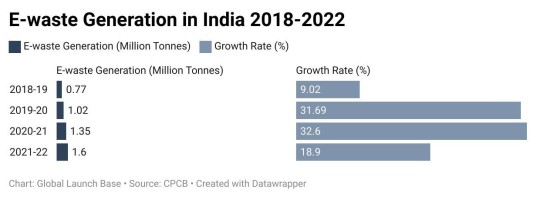
y:
Figure: E-waste Generation in India
India's exponential growth in electronic consumption has translated into a staggering volume of electronic waste generation. The proliferation of electronic gadgets, ranging from smartphones and laptops to household appliances and industrial machinery, has permeated every facet of Indian society. With a population exceeding 1.3 billion and a rapidly expanding middle class, the demand for electronic goods has reached unprecedented levels.
According to a report by the Central Pollution Control Board (CPCB), India generated approximately 3.2 million metric tons of e-waste in 2019, with an annual growth rate of 21%. This exponential growth trajectory underscores the urgent need for comprehensive e-waste management strategies that balance environmental preservation with economic prosperity.
The composition of electronic waste in India is diverse and encompasses a wide range of products, including obsolete televisions, refrigerators, air conditioners, washing machines, and electronic toys. Additionally, the proliferation of personal computing devices such as smartphones, tablets, and laptops has contributed significantly to the e-waste stream. These devices often contain valuable metals and components, making them lucrative targets for recycling and resource recovery.
Furthermore, the lifespan of electronic products in India tends to be relatively short due to factors such as rapid technological obsolescence, frequent upgrades, and shifting consumer preferences. As a result, a significant portion of electronic goods is discarded prematurely, exacerbating the e-waste challenge.
The management of electronic waste poses multifaceted challenges, including inadequate infrastructure, limited awareness among consumers, and the prevalence of informal recycling practices. Without effective intervention, the accumulation of electronic waste not only threatens environmental integrity but also jeopardizes human health and wellbeing.
In light of these challenges, the Indian government has recognized the importance of addressing e-waste management comprehensively. Initiatives such as the Digital India campaign and the Make in India initiative have spurred economic growth and technological innovation but have also underscored the need for sustainable consumption and production practices.
The scale and complexity of India's electronic waste challenge necessitate concerted efforts from all stakeholders, including government agencies, manufacturers, recyclers, and consumers. By adopting a holistic approach that integrates regulatory frameworks, technological innovations, and public awareness campaigns, India can chart a path towards a more sustainable and circular economy.
As India continues its journey towards economic prosperity and technological advancement, the responsible management of electronic waste will play a pivotal role in shaping the nation's environmental footprint and legacy for future generations. Through collaborative action and collective commitment, India can harness the potential of its recycling industry to mitigate environmental degradation, promote resource conservation, and foster sustainable development.
The Indian government is taking steps to formalize the e-waste recycling industry. In 2011, it introduced the E-Waste (Management) Rules, which require manufacturers and brands to take back and recycle their products. However, the implementation of these rules has been slow and uneven.
The Indian electronic goods recycling industry is a complex and rapidly evolving landscape. It is characterized by a mix of formal and informal sectors, with the informal sector currently dominating the market. This has both positive and negative implications, as we will explore below.
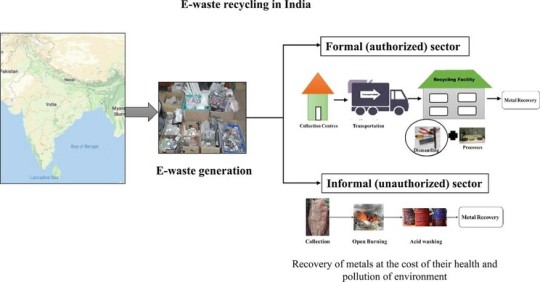
Formal sector:
Registered e-waste recyclers: These are companies that have been authorized by the government to collect, process, and dispose of e-waste in an environmentally sound manner. They typically have invested in sophisticated recycling infrastructure and employ trained personnel.
Advantages: Formal sector recyclers offer a more responsible and sustainable way to recycle e-waste. They are able to extract valuable materials from e-waste, such as metals, plastics, and glass, which can then be used to make new products. This helps to conserve resources and reduce pollution.
Disadvantages: Formal sector recyclers can be more expensive than informal recyclers. This is because they have to comply with stricter environmental regulations and pay for the cost of their infrastructure and personnel.
Informal sector:
Backyard and community-based operations: These are small-scale operations that typically collect e-waste from households and businesses. They then manually extract valuable materials, such as copper and gold, which they sell to scrap metal dealers.
Advantages: Informal recyclers are often able to offer lower prices than formal recyclers. This is because they do not have to comply with the same environmental regulations and do not have the same overhead costs.
Disadvantages: Informal recycling operations often pose serious health and environmental risks. They often burn e-waste to extract metals, which releases toxic fumes into the air. They also often do not properly dispose of hazardous materials, such as lead and mercury, which can contaminate soil and water.
The future of the Indian e-waste recycling industry is likely to be shaped by a number of factors, including:
The continued growth of the Indian economy: As the Indian economy grows, so too will the amount of e-waste that is generated. This will create a demand for more e-waste recycling capacity.
Increasing government regulation: The Indian government is likely to continue to introduce stricter regulations on e-waste recycling. This will help to level the playing field between formal and informal recyclers and encourage more responsible recycling practices.
Technological innovation: New technologies are emerging that can make e-waste recycling more efficient and cost-effective. This could help to make formal sector recycling more competitive with informal recycling.
Challenges and Opportunities
Despite the commendable efforts of the recycling industry, several challenges persist. One major obstacle is the prevalence of informal recycling practices, characterized by rudimentary techniques and inadequate safety measures. These informal recyclers, often operating in unregulated environments, pose environmental and health hazards while contributing to resource wastage.
However, amidst these challenges lie significant opportunities for innovation and growth. The Indian government has introduced several regulatory frameworks to promote responsible e-waste management, including the E-Waste (Management) Rules, 2016. These regulations mandate extended producer responsibility (EPR), compelling manufacturers to take accountability for the entire lifecycle of their products, from production to disposal.
Technological Innovations Driving Sustainability
In recent years, technological advancements have played a pivotal role in enhancing the efficiency and sustainability of e-waste recycling processes. Innovations such as automated sorting systems, chemical recycling techniques, and modular design approaches have revolutionized the industry, enabling greater resource recovery while minimizing environmental impact.
Furthermore, the advent of blockchain technology holds promise for enhancing transparency and traceability within the recycling supply chain. By leveraging blockchain-enabled platforms, stakeholders can securely track the movement of e-waste throughout its lifecycle, ensuring compliance with regulatory standards and promoting ethical practices.
Emerging Indian Companies in the Recycling Industry
Attero Recycling: Attero Recycling is a leading electronic waste management company in India. It specializes in recycling and refurbishing electronic devices, including smartphones, laptops, and televisions, while ensuring environmentally sustainable practices.
Gem Enviro Management Pvt. Ltd.: Gem Enviro Management is a pioneer in the field of electronic waste management and recycling in India. The company offers end-to-end solutions for the collection, dismantling, and recycling of electronic waste, adhering to international standards and regulations.
E-Parisaraa Pvt. Ltd.: E-Parisaraa is a Bangalore-based e-waste management company that provides environmentally responsible solutions for electronic waste recycling. The company focuses on resource recovery and material reuse through advanced recycling processes.
Ecoreco: Ecoreco is an electronic waste management company that offers comprehensive recycling solutions for businesses, households, and government agencies in India. It utilizes state-of-the-art technology and best practices to ensure the safe and sustainable disposal of electronic waste.
Karma Recycling: Karma Recycling is a Delhi-based company that specializes in the refurbishment and resale of used smartphones. The company aims to extend the lifecycle of electronic devices by offering buyback and recycling services, thus reducing electronic waste generation.
Earth Sense Recycle: Earth Sense Recycle is a Mumbai-based e-waste management company that provides collection, recycling, and disposal services for electronic waste. The company focuses on promoting awareness and education about responsible e-waste management practices.
Virogreen India Pvt. Ltd.: Virogreen India is an ISO-certified e-waste management company that offers end-to-end solutions for the recycling and disposal of electronic waste. The company operates across multiple cities in India, catering to both corporate and individual clients.
Greentek Reman Pvt. Ltd.: Greentek Reman is a Hyderabad-based company that focuses on remanufacturing and refurbishing electronic components and devices. The company aims to reduce electronic waste by extending the lifespan of products through repair and reuse initiatives.
The Role of Consumer Awareness
Amidst the ongoing evolution of the recycling industry, consumer awareness remains a crucial factor in driving sustainable change. Educating consumers about the importance of responsible e-waste disposal, encouraging product repair and refurbishment, and promoting the purchase of eco-friendly electronics are vital steps towards fostering a culture of sustainability.
Conclusion
The Indian recycling industry of electronic goods stands at the intersection of environmental conservation, technological innovation, and economic development. By embracing sustainable practices, leveraging cutting-edge technologies, and fostering widespread awareness, India has the potential to emerge as a global leader in e-waste management.
As we navigate the complexities of a digital age, the journey towards a circular economy hinges on our collective commitment to redefining the way we produce, consume, and dispose of electronic goods. In the pursuit of a greener, more sustainable future, the Indian recycling industry serves as a beacon of hope, demonstrating the transformative power of innovation and collaboration in tackling one of the most pressing challenges of our time.
About Global Launch Base:
Global Launch Base helps international startups expand in India. Our services include market research, validation through surveys, developing a network, building partnerships, fundraising, and strategy revenue growth. Get in touch to learn more about us.
Contact Info:
Website: www.globallaunchbase.com
LinkedIn: https://www.linkedin.com/company/globallaunchbase/
Email: [email protected]
#CircularEconomy#India#GreenTechnology#EWaste#EWasteRecyclingCenters#ReduceReuseRecycle#Electronics#SustainableDevelopment#DigitalWasteManagement#EnvironmentalSustainability#EWasteAwareness#TechRecycling#ResponsibleConsumption
0 notes
Text
IT Asset Disposition Market to Grow from $15.6 Billion in 2023 to $31.0 Billion by 2033, Reflecting a 6.9% CAGR
IT Asset Disposition Market is rapidly gaining traction as organizations prioritize secure, sustainable, and compliant disposal of outdated technology. With the increasing turnover of IT equipment driven by advancements in hardware and the shift to remote work, companies are seeking eco-friendly ways to manage their e-waste. ITAD solutions go beyond recycling, incorporating secure data destruction, refurbishment, and resale of assets to maximize value while adhering to strict environmental regulations. This approach ensures not only responsible waste management but also a potential revenue stream for businesses.
To Request Sample Report: https://www.globalinsightservices.com/request-sample/?id=GIS20707 &utm_source=SnehaPatil&utm_medium=Article
As digital transformation accelerates, the ITAD market is evolving with cutting-edge services such as blockchain-enabled tracking for transparency and AI-driven asset evaluation. Growing awareness about corporate social responsibility (CSR) and the global push toward achieving net-zero goals are further fueling demand. With a projected CAGR of over 7% in the coming years, ITAD services are becoming a critical component of IT lifecycle management, combining sustainability with security and profitability.
#ITADMarket #SustainableTech #EwasteManagement #DataSecurity #ITAssetDisposal #CircularEconomy #GreenIT #NetZeroGoals #TechRecycling #CorporateResponsibility
0 notes
Text
IT Asset Disposition to $31.0B by 2033, 6.9% CAGR
IT Asset Disposition Market : As technology evolves rapidly, businesses face the challenge of properly disposing of outdated IT assets, including computers, servers, and smartphones. IT Asset Disposition (ITAD) provides a sustainable and secure solution by ensuring that obsolete hardware is recycled, resold, or disposed of in compliance with environmental and data protection standards. By partnering with certified ITAD providers, companies can mitigate the risk of data breaches, minimize electronic waste, and contribute to a circular economy. These services not only protect sensitive data but also help recover value from retired assets, making ITAD a vital part of responsible technology management.
To Request Sample Report : https://www.globalinsightservices.com/request-sample/?id=GIS20707 &utm_source=SnehaPatil&utm_medium=Article
The importance of ITAD is growing as businesses prioritize sustainability and regulatory compliance. With eco-friendly practices like responsible recycling and certified data destruction, ITAD ensures that companies can confidently retire their equipment without compromising security or the environment. Advanced tracking and reporting systems allow businesses to verify every step of the disposal process, ensuring transparency and accountability. As companies continue to innovate, ITAD plays a key role in supporting both environmental goals and corporate responsibility.
#ITAssetDisposition #TechRecycling #DataSecurity #SustainableIT #EwasteManagement #GreenTech #DataDestruction #SecureDisposal #TechSustainability #CircularEconomy #ElectronicWaste #EcoFriendlyTech #ITAD #RecyclingSolutions #BusinessResponsibility
0 notes
Text

Contact below for recycling your favorite electronic devices responsibly. Let's make eco-friendly choices together! 📱💻🔋 #TechRecycling #EWasteTips
Call Us : +919769077008
Mail Us : [email protected]
www.ewasterecyclingindia.com
0 notes
Text
How AI is Revolutionizing E-Waste Sorting and Recycling

As the digital age accelerates, so does the mountain of outdated electronics. From smartphones and laptops to servers and industrial hardware, the volume of discarded gadgets is creating an urgent demand for smarter and more sustainable solutions. Enter Artificial Intelligence (AI) the game-changer in e-waste recycling.
Smarter Sorting with AI-Powered Automation
Conventional sorting of e-waste is labor-intensive, slow, and often inefficient. Today, AI-driven systems, equipped with sensors and computer vision, can detect and classify valuable components from a heap of discarded electronics in seconds. These technologies identify metals like gold, copper, and lithium with high accuracy improving recovery rates and minimizing environmental harm.
Real-Time Recognition and Precision Dismantling
AI doesn’t just sort faster it sorts smarter. With machine learning, systems can now differentiate between complex circuit boards, plastics, batteries, and glass. This real-time recognition ensures cleaner segregation, supporting sustainable e-waste management and reducing toxic contamination in landfills.
Optimizing E-Waste Collection and Operations
AI is also transforming how e-waste companies manage operations. From tracking devices through their lifecycle to predicting collection volumes, AI streamlines logistics for electronic waste disposal. Many electronic recycling centers and technology recycling services are now using AI-based analytics to boost efficiency and reduce costs.
The Future of Electronic Waste Solutions
Looking ahead, AI will drive innovation across every stage of the recycling chain. From robotic arms dismantling old computers to intelligent software forecasting material recovery, the future of e-waste solutions is powered by smart tech.
With India advancing rapidly in the digital space, adopting AI in e-waste management is not just a trend it's a necessity.
For more details, visit www.techazar.in
#EWasteRecycling#ArtificialIntelligence#TechRecycling#SustainableEWaste#RecyclingInnovation#SmartWasteManagement#ElectronicWasteSolutions#GoGreenIndia#RecycleTech#AIForSustainability#DigitalWasteManagement#ElectronicDisposal#CircularEconomy#EwasteIndia#Techazar
0 notes
Text

What looks like waste could be worth more than gold. Yes, old devices have that kind of potential. 🪙♻️
Smart recycling recovers precious materials, reduces harmful mining, and protects our planet.
0 notes
Photo

SHOCK ROCKETS Sixty years in the future, (40 years now) Earth is protected by the Shockrockets--an unbeatable squadron of hi-tech aircraft, built from a fusion of alien technology and the best Earth has to offer. Manned by the world's most elite pilots, the Shockrockets protect an unstable Earth as it rebuilds from a devastating invasion from space. Young, tech-mad Alejandro Cruz becomes the newest Shockrockets pilot by a freak of chance. Can he get up to speed before the Shockrockets' greatest foe takes over the world? Shockrockets delivers all-out aerial action and science fiction thrills, courtesy of Kurt (Astro City) Busiek and Stuart (Ultimate Spider-Man) Immonen. Image Written by Kurt Busiek Art by Stuart Immonen https://www.comixology.com/Shockrockets/digital-comic/955740 This series originally came out in 2000. I loved it. Our hero builds his things from discarded old devices in a junkyard. This comic is something that I have thought about over and over since I read it the same way I often thought about George Orwell’s thoughts on razor blades from 1984 most times I would shave with a less than new razor. Back when I used to shave. #shockrockets #KurtBusiek #stuartImmonen #astrocity #imagecomics #georgeorwell #1984 #georgeorwells1984 #dullrazorblades #techrecycling #ewaste #ewasterecycling #electronicsrecycling #junkyard #comics #newcomics #newcomicbookday #wehaveignition #alejandrocruz #elitepilots #pilots #pilot (at Portland, Oregon) https://www.instagram.com/p/CSLBBnvlRAc/?utm_medium=tumblr
#shockrockets#kurtbusiek#stuartimmonen#astrocity#imagecomics#georgeorwell#1984#georgeorwells1984#dullrazorblades#techrecycling#ewaste#ewasterecycling#electronicsrecycling#junkyard#comics#newcomics#newcomicbookday#wehaveignition#alejandrocruz#elitepilots#pilots#pilot
2 notes
·
View notes
Link
This article contains useful information about the WEEE recycling services that are used to dispose of the Waste IT devices and secure and proper disposal of the important data in the devices.
0 notes
Text
Revolutionizing E-Waste Management in India: Spotlight on WasteMaterial
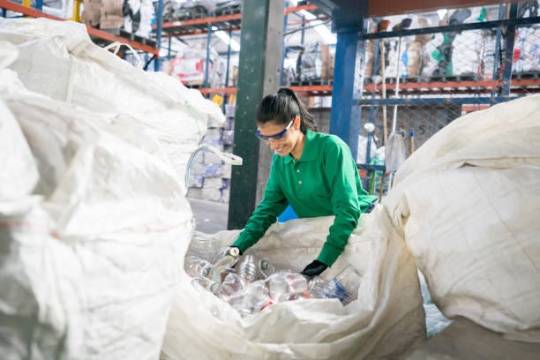
Understanding the E-Waste Conundrum in India
India stands at the cusp of a digital revolution, with a burgeoning consumer base embracing the latest gadgets and gizmos. However, this surge in technology adoption comes with a hidden cost — the generation of vast quantities of electronic waste. According to recent studies, India generates approximately 2 million tons of E-Waste Management companies in India annually, a figure expected to escalate rapidly in the coming years.
The disposal of e-waste poses a myriad of challenges, ranging from environmental pollution to public health hazards. Improper handling of electronic waste releases toxic substances such as lead, mercury, and cadmium into the soil and water bodies, contaminating the environment and endangering human health. Moreover, the rampant practice of informal recycling in unregulated scrapyards exacerbates these issues, exposing vulnerable communities to hazardous working conditions and health risks.
Enter WasteMaterial: Pioneering Sustainable Solutions
Amidst this grim scenario, WasteMaterial emerges as a trailblazer in the realm of E-Waste Management companies in India. Founded with a vision to create a sustainable future, WasteMaterial employs innovative technologies and best practices to tackle the e-waste epidemic head-on.
At the heart of WasteMaterial operations lies a commitment to responsible recycling. Unlike conventional methods that often prioritize profit over sustainability, WasteMaterial adopts a holistic approach that prioritizes environmental stewardship and social responsibility. Through a network of state-of-the-art recycling facilities, WasteMaterial ensures that end-of-life electronics are dismantled, processed, and recycled in an eco-friendly manner, minimizing harm to the environment and human health.
Key Initiatives and Impact
WasteMaterial’s impact extends far beyond the realms of environmental conservation. By championing the cause of E-Waste Management companies in India, the company catalyzes socio-economic development and empowers local communities.
One of WasteMaterial’s flagship initiatives is its focus on creating awareness and driving behavioral change. Through outreach programs and educational campaigns, WasteMaterial educates consumers and businesses about the importance of responsible e-waste disposal and the benefits of recycling. By fostering a culture of environmental consciousness, WasteMaterial strives to instill lasting change and pave the way for a sustainable future.
Furthermore, WasteMaterial is committed to fostering inclusive growth by providing livelihood opportunities to marginalized communities. Through its recycling facilities, the company creates jobs and empowers informal waste workers, offering them formal employment, training, and access to social benefits. By integrating inclusivity into its business model, WasteMaterial not only mitigates the adverse effects of e-waste but also contributes to poverty alleviation and social equity.
Looking Ahead: Towards a Greener Tomorrow
As India stands at a crossroads in its journey towards sustainable development, WasteMaterial serves as a beacon of hope, illuminating the path towards a greener, cleaner future. By leveraging technology, innovation, and a steadfast commitment to environmental stewardship, WasteMaterial redefines the landscape of E-Waste Management companies in India.
As we navigate the complexities of the 21st century, WasteMaterial reminds us that sustainability is not merely a choice but a collective responsibility. By joining hands with visionary organizations like WasteMaterial, we can pave the way for a future where prosperity is synonymous with environmental preservation, and progress is measured not only in economic terms but also in terms of social and environmental impact. Together, let us embark on this journey towards a brighter tomorrow, where waste is no longer a burden but a valuable resource, and where every action we take today shapes the world we leave for future generations.
#EWasteManagement#WasteMaterial#SustainableTech#GreenIndia#RecycleResponsibly#TechRecycling#EnvironmentalStewardship#SustainableDevelopment#EcoFriendly#GreenLiving
0 notes
Text
How Can Businesses Safely Dispose of IT Equipment?

Out with the Old, But Not into the Trash Here's What Smart Businesses Are Doing with Their IT Waste
Is your office storage overflowing with outdated laptops, old monitors, and dusty CPUs? Think tossing them out is the solution? Think again.
Every piece of IT equipment holds more than just data it holds environmental risk, legal liability, and missed opportunity. As technology moves fast, businesses need to move smarter.
At Techazar, we help businesses across India transform their electronic waste into a safe, secure, and sustainable process. Whether you're in Chennai, Bangalore, Hyderabad, or Cochin, disposing of your IT assets the right way isn’t just good practice, it’s smart business.
Why Is the Safe Disposal of IT Equipment Important?
Disposing of IT assets carelessly can lead to serious risks:
Data breaches from improperly erased hard drives
Environmental harm from toxic components like mercury, lead, and cadmium
Legal issues due to non-compliance with government regulations
To avoid these issues, businesses must partner with a certified e-waste company like Techazar to ensure secure and sustainable disposal.
Steps to Safely Dispose of IT Equipment
1. Create an Inventory of Old IT Equipment
Start by identifying all outdated or unused equipment in your workplace. This includes:
Laptops, desktops, and CPUs
Printers, scanners, and monitors
Servers and storage devices
Routers, switches, and other networking gear
Keyboards, mice, and cables
2. Secure Data Backup and Destruction
Before disposing of any IT asset, ensure all sensitive business data is backed up and securely destroyed. Data must be wiped using certified methods or physically destroyed.
Techazar provides data destruction services that meet ISO, CPCB, and TNPCB standards. We also issue a data destruction certificate for every completed service to give you complete peace of mind.
3. Reuse or Donate Functional Equipment
If the equipment is still working, consider reusing it within your business or donating it to educational institutions or NGOs. This helps extend the lifecycle of your devices and reduces electronic waste.
Techazar also supports refurbishment and resale of old equipment, enabling clients to recover value while promoting sustainable e-waste management.
4. Recycle Through Certified E-Waste Companies
Avoid unverified scrap dealers who do not follow environmental standards. Work with licensed, CPCB-authorized e-waste handlers like Techazar who ensure eco-friendly recycling and proper dismantling.
Our services include:
On-site and scheduled e-waste pickup
Electronic waste collection near you
E-waste certificate for compliance records
Recycling of computer waste, laptops, and office electronics
Why Choose Techazar for IT Equipment Disposal?
Techazar is a leading IT disposal company offering complete Pan India services. Here’s why businesses trust us:
Certified by CPCB, TNPCB, and ISO-compliant
Comprehensive e-waste collection and recycling solutions
Safe handling of electronic scrap and sensitive equipment
Support for Extended Producer Responsibility (EPR) compliance
Trusted by clients for business e-waste pickup and recycling and waste management
What We Collect and Recycle
Desktops, laptops, and CPUs
Monitors and LED panels
Printers and copiers
Servers, data storage devices
Routers, modems, and other IT peripherals
Cables, connectors, and accessories
Whether you’re searching for "e waste near me", "computer recycling near me", or "electronic waste disposal near me", Techazar provides end-to-end solutions tailored to your business.
Ready to Dispose of Your IT Equipment Safely?
Disposing of IT assets doesn't have to be complicated. With Techazar, you get secure, certified, and eco-friendly e-waste recycling services backed by a professional team and a wide network across India.
Contact Techazar today to schedule a free consultation or pickup service.
Choose Smart. Choose Sustainable. Choose Techazar.
When your business chooses Techazar, you’re not only managing e-waste responsibly, you’re also protecting your data, complying with regulations, and supporting a greener future.
Let’s transform your IT waste into an opportunity for impact.
For more details, visit www.techazar.in
#EwasteDisposal#ElectronicWaste#ITAssetDisposition#DataDestruction#GreenIT#RecycleIT#SustainableBusiness#EwasteSolutions#ITDisposal#EwasteManagement#CircularEconomy#SafeITDisposal#EcoFriendlyBusiness#CorporateSustainability#TechRecycling#EwasteIndia#EwasteChennai#EwasteBangalore#EwasteHyderabad#EwasteCochin#EwasteTamilNadu#EwasteKerala#EwasteKarnataka#RecycleIndia#PanIndiaServices#DataSecurity#DataWipe#EwasteCertificate#CPCBCompliant#ISOCertified
0 notes